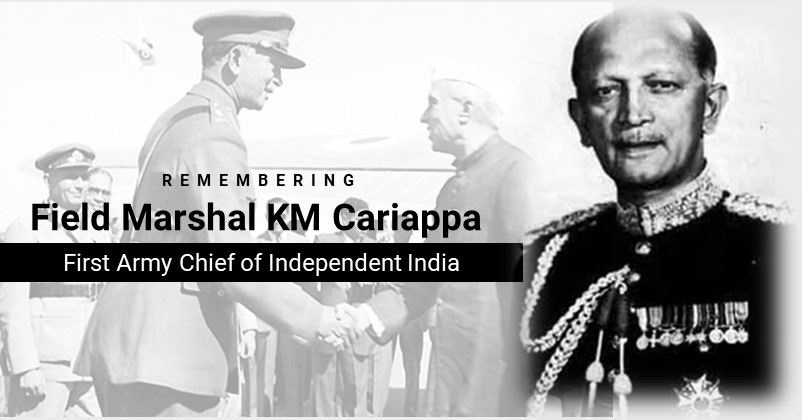Remembering Field Marshal KM Cariappa on his death anniversary– the first Army Chief of Independent India

Field Marshal K.M Cariappa, the man with a distinguished stint in the Armed forces was the first Commander-in-Chief of the Independent India who took over the charge of the Indian Army from its last British Commander-in-Chief, General Sir Roy Bucher. He had received the prestigious Order of the British Empire, OBE, for his role in Burma against the Japanese during the Second World War. Having led an illustrious career in the Army achieving many ‘firsts’, he was the first Indian Officer to be given command of a unit in 1942 and went on to hold the highest title in the Indian Army as Field Marshal. Post the Independence of India, he led the Indian forces on the Western Front during the Indo-Pak war of 1947. During the entire span of his career, which lasted almost three decades, from 1918 to 1953, he served in countries like Syria, Iraq, Iran, and Burma. At the age of 94, he breathed his last in Bangalore on 15th May 1993.
Field Marshal Kodandera Madappa Cariappa, other than Field Marshal Sam Manekshaw, is the only one to have held the highest honor of the Indian Army and was given the title in 1983 by the government of India. On 15th January 1949, he was appointed as the Commander-in-Chief of the independent Indian Army. After retiring from the Indian Army in 1953, he served as High Commissioner to Australia and New Zealand till 1956.
Who was Field Marshal K.M ‘Kipper’ Cariappa! Why 15th January is celebrated as the Army Day
Before Cariappa began his stint in the Army under the British, he added many ‘firsts’ to his credit. Born on 28th January 1899 in Coorg, Cariappa did his schooling from Madikeri in Karnataka and graduation at the Presidency College in Madras, now Chennai. He was an active sportsman and when got selected among very few for the first batch of the King’s Commissioned Indian Officers at the Daly Cadet College in Indore, was commissioned in the Carnatic Infantry. Cariappa was in active service with the 37 Dogra in Mesopotamia, present-day Iraq and then posted to the 2nd Rajput Light Infantry. He went on to become the first Indian officer to undergo the course at Staff College, Quetta in 1933. From 1941- 44 he actively served in countries like Iraq, Iran, Syria and Burma and became the Commander of a Regiment in 1942.
In 1947, Cariappa became the first Indian to go to the UK for a training course at the Imperial Defence College and was promoted to the substantive rank of Lt. Colonel soon. When he got promoted as the Brigadier of the Frontier Brigade Group, the same year, he led the Indian forces on the western front during the Partition in 1947. It was in 1949 that Cariappa took over the reins of the Indian Army from Sir Roy Bucher and left a remarkable identity with his illustrious work during his tenure. In 1951, owing to his efforts in improving the Indo-US relations, US President Harry Truman conferred on him the ‘Order of the Chief Commander of the Legion of Merit’ – the first-ever award of its kind given to an Indian General.
Colonel Ayub Khan, who after partition became Field Marshal and President of Pakistan during 1962-1969, once served Cariappa under his command. After India’s independence, KM Cariappa was first appointed as the Deputy Chief of General Staff and became Major General. During the partition in 1947, he remarkably handled the division of the Indian Army following Indo-Pakistan conflicts, he was the Eastern Army Commander and General Officer Commanding-in-Chief of Western Command who directed operations for capturing back several sectors like Zojila, Drass and Kargil. He not only successfully recaptured the sectors but also succeeded in establishing a link with Leh. To his credit, he had many awards and accolades.
As it was on 15th January 1949 that an independent Indian Army received its first Commander-in-Chief K.M Cariappa, hence the day is celebrated as the Army Day.